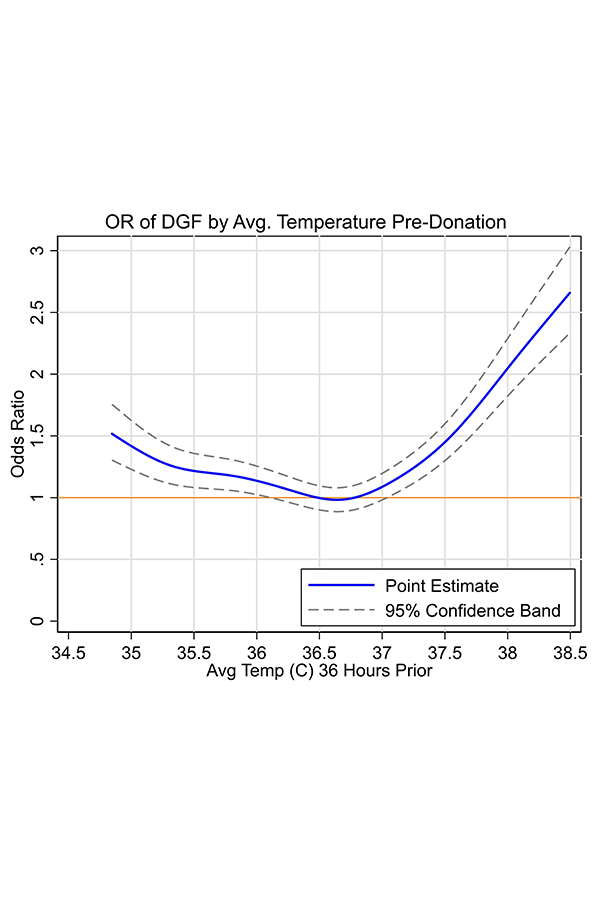Deceased Donor Body Temperature is Associated with Delayed Graft Function in Kidney Transplant Recipients
1Department of Surgery, University of Pennsylvania, Philadelphia, PA, 2Division of Gastroenterology, University of Pennsylvania, Philadelphia, PA, 3Department of Biostatistics, Epidemiology, and Informatics, University of Pennsylvania, Philadelphia, PA, 4Renal-Electrolyte and Hypertension Division, Department of Medicine, Center for Clinical Epidemiolog, University of Pennsylvania, Philadelphia, PA, 5Division of Digestive Health and Liver Diseases, Department of Medicine, University of Miami, Miami, FL, 6Division of Transplant Surgery, Department of Surgery, University of Pennsylvania, Philadelphia, PA
Meeting: 2020 American Transplant Congress
Abstract number: LB-026
Keywords: Graft function
Session Information
Session Name: Poster Session C: Late Breaking
Session Type: Poster Session
Date: Saturday, May 30, 2020
Session Time: 3:15pm-4:00pm
 Presentation Time: 3:30pm-4:00pm
Presentation Time: 3:30pm-4:00pm
Location: Virtual
*Purpose: Delayed graft function (DGF) among kidney transplant recipients complicates the post-operative course and is associated with graft failure. Intentional cooling of the donor may reduce the risk of DGF, however the association between deceased donor body temperature prior to procurement and risk of DGF has not been validated.
*Methods: We conducted a retrospective analysis of U.S. adult kidney transplant recipients between 2006-2018. A weighted temperature average was calculated for the 36 hours prior to donation. We modeled temperature using restricted cubic splines and performed mixed effects logistic regression to evaluate the relationship between temperature and DGF.
*Results: Among 106,575 recipients, 25.3% experienced DGF. The 36-hour average body temperature (median:36.74C, IQR:36.39-37.10C), after adjusting for known risk factors, was significantly associated with DGF (p<0.001) with the lowest odds of DGF at 36.5C (Figure). The lowest odds of DGF remained at mild hypothermia after stratification by kidney donor profile index (<20, 20-79, ≥80) and donor type (neurologic vs. cardiac death). Restricting the weighted temperature average to the 24 hours prior to donation (median:36.75C, IQR:36.40-37.10C) demonstrated a similar relationship with DGF (p<0.001).
*Conclusions: In this cohort deceased donor temperature prior to organ recovery was associated with recipient risk of DGF. These data may support interventions to adjust donor temperature in order to reduce the risk of DGF.
Research reported in this publication was supported by the National Center for Advancing Translational Sciences of the National Institutes of Health under award number TL1TR001880. The content is solely the responsibility of the authors and does not necessarily represent the official views of the National Institutes of Health.
To cite this abstract in AMA style:
Mancinelli J, Mahmud N, Krumeich L, Harhay M, Reese PP, Goldberg D, Abt P. Deceased Donor Body Temperature is Associated with Delayed Graft Function in Kidney Transplant Recipients [abstract]. Am J Transplant. 2020; 20 (suppl 3). https://atcmeetingabstracts.com/abstract/deceased-donor-body-temperature-is-associated-with-delayed-graft-function-in-kidney-transplant-recipients/. Accessed March 2, 2026.« Back to 2020 American Transplant Congress

